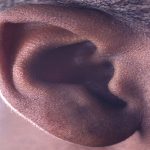
A small electric “tickle” to the ear may affect the body’s nervous system, and British researchers claim this can promote overall well-being and may potentially slow down some effects of aging. The tickle treatment is called transcutaneous vagus nerve stimulation (tVNS). The procedure involves placing custom-made clips containing electrodes on the part of your ear called the tragus; that’s the small, pointed tip above your ear lobe. A small electrical current is delivered through the clips to affect the vagus nerve. The vagus nerve is part of the autonomic nervous system, which is responsible for body functions you don’t think about, like blood pressure, temperature and heart rhythm. The study authors suggest that the device may help balance the autonomic system. “We saw that just two weeks of daily tVNS helped to re-balance the levels of activity in the two branches of the autonomic nervous system,” said Susan Deuchars, one of the study’s authors. She’s director of research in the School of Biomedical Sciences at the University of Leeds in England. “These branches normally work in balance to allow healthy levels of activity. As we age — and also in certain clinical conditions — this balance changes so that the sympathetic branch predominates and this can be detrimental for health. tVNS daily seems to redress the balance of this activity towards that associated with healthy… read on >


































-300x200.jpg)